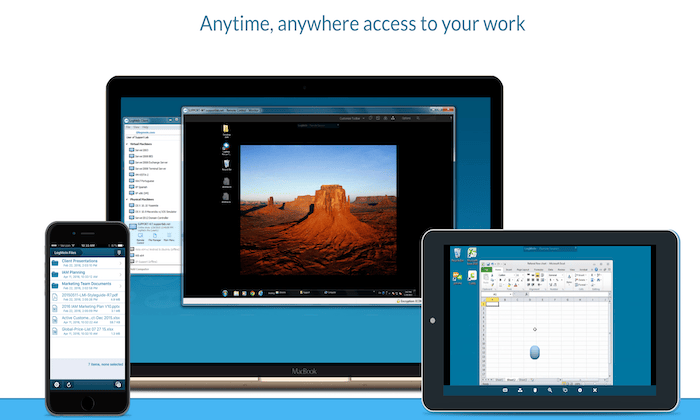
Disclosure: This content is reader-supported, which means if you click on some of our links that we may earn a commission.
Have you ever been in your office and realized the files you need are on your home computer? Maybe you’re working remotely or meeting a client, but need to access an app from your office PC.
With remote access software, you can view or access another computer from anywhere in the world. This ability is extremely versatile.
You might use it to log into a client’s computer and help them overcome technical questions. Or you can share your screen with colleagues as you run a demo on your device.
You can even transfer files between two computers without having to go through email or file-sharing software—even from unattended devices.
It’s a common misconception that remote access software is only for help desks, but these tools can be used by anyone.
Which remote access software is the best? It’s going to depend on what you need it to do. Keep reading to discover the top options on the market and how to find the one that will benefit your teams the most.
The Top 5 Options For Remote Access Software
- Parallels Access — Best for remote desktop access
- TeamViewer — Best for macOS and iOS
- Remote Utilities — Best remote access for IT teams
- Zoho Assist — Best for customer support
- LogMeIn Pro — Best for anytime file and application access
How to Choose the Best Remote Access Software For You
Finding the right remote access software can be tough if you don’t know what to look for.
At the same time, there are a few really important factors that you can use to evaluate each option. These will eliminate options that aren’t going to work and bring the right ones into view.
Let’s walk through the core considerations that will help you find a product that meets your needs.
Compatible Devices
The first thing you need to do is figure what types of devices and operating systems you’ll be using. All of the best remote access tools should have cross-platform access.
Examples include Mac, Windows, Linux, Chrome OS, Android, iOS, BlackBerry, Raspberry Pi, Windows Mobile, etc.
With that said, if you’re just using the remote access software for personal use or for a small team, you might not need a tool that’s compatible with every device under the sun—just the device’s that you’re using.
But if you need remote access software to assist clients or thousands of employees, you’ll want to have more versatility.
Security
When it comes to remote access, security will always be a top concern. Is it really that easy for a third party to just access your devices? What type of sensitive information will they have access to?
Software vendors understand this concern. That’s why they add security features like 256-bit encryption, one-time access codes, two-factor authentication, etc.
Always make sure that the remote access software you’re evaluating meets any industry-specific security requirements, such as HIPAA for healthcare.
Number of Devices
Not every remote access software is built to scale. If you’re deploying it with a team of five employees, you likely won’t be using the same software as an organization that needs the software to access 500 or 5,000 devices.
All plans will have limitations in terms of device quantities.
You might come across certain tools with unlimited user access. But unlimited users and unlimited devices are two different things. So be prepared to purchase additional licenses if you have a larger team and need the software on lots of devices.
Functionality
The term “remote access” is pretty broad. Within that category, there are lots of potential functionalities and use cases for the software. Features to keep an eye out for include:
- Third-party integrations
- Remote printing
- Multiple monitor access
- File sharing
- Live chat
- Screen recording
- Unattended access
You don’t necessarily need all of these features. It’s just a matter of how you plan to use the software for your personal and business needs. There’s no reason to pay extra for plans with extensive feature lists that you’ll never actually use.
Support
Generally speaking, remote access software should be fairly easy to deploy. But certain solutions are a bit more complicated, especially at scale.
If you need assistance with the setup process, the software vendor should be there to make sure things go smoothly for you. When something goes wrong or if you have questions, you don’t want to be left on an island to figure it out by yourself.
For those of you who have a dedicated IT team, they should be able to manage everything without an issue. But not every business has those in-house resources, so support from the software provider should be a top priority.
The Different Types of Remote Access Software
Not every remote access solution is the same. This software can be segmented into a handful of different categories. However, some software will offer a combination of these types within a single solution.
On-Demand Access
On-demand tools require permission to gain access. Let’s say an IT agent wanted to help a remote employee with a problem on their computer, that employee would need to grant the IT team access in order for them to view and take actions on the screen.
In short, two people must be present (one on each device) for on-demand access software to work.
Unattended Access
Unattended remote access software is the opposite of on-demand. This solution allows you to access devices even if nobody on the other computer.
In most cases, people use unattended access software for their personal devices. For example, you could be in the office and access a presentation, file, or application on your home computer.
But a prospect or client wouldn’t give you unattended access to their personal devices. You’d have to get permission every time (on-demand access).
Cloud-Based Remote Access Software
A cloud-based remote access solution doesn’t need to be installed locally on the device. This is also known as browser-based remote access software.
For example, let’s say you’re trying to access the device of a client to help them troubleshoot a software issue. Or maybe you want a prospect to view your screen as you run a demo. These users shouldn’t be forced to install anything locally. Access to the device can be granted using a web-based link.
Installation-Based Remote Access Software
As the name implies, an installation-based remote access solution must be installed locally on a device to work.
All unattended access software must be installed on at least one device. Otherwise, there would be no way for you to gain access since a person won’t be there to grant permission.
Help Desk Software
Help desk software is in a category of its own. It’s worth noting that not every help desk solution comes with remote access capabilities. Lots of times, help desk software is used for things like ticket support and customer service.
However, some help desk tools do offer remote access functions. This feature is prominent in IT help desk software, designed for in-house support.
#1 – Parallels Access Review — Best for Remote Desktop Access
Parallels Access is a quick, simple, and reliable way to access your computer from anywhere. It’s one of the best ways to retrieve all of your files and applications, no matter where you are in the world.
With just a few clicks, you can connect to your desktop from any mobile device or web browser.
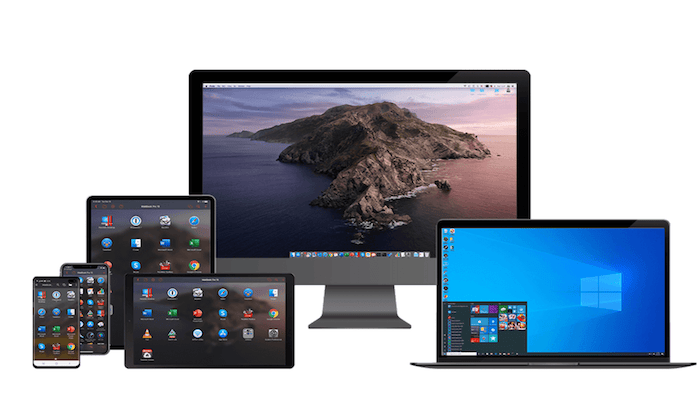
Parallels Access is feature-rich and extremely versatile. Let’s take a closer look at why this software ranks so high on my list:
- Access your computer from any web browser with no additional hardware required
- Use full-screen applications
- Gain full access over PC applications, as if they were installed locally
- The software is fully optimized for screen resolution and optimal readability
- Access files on remote computers or files stored in the cloud
- Manage files by sorting, copying, renaming, deleting, etc.
- Ability to share files with friends and co-workers
- Copy/paste text and edit files remotely
If you’re going to install Parallels Access on your computers, then I strongly recommend getting the mobile app for your smartphone or tablet. Then your computer can essentially be in your pocket at all times.
Don’t have the smartphone with you? No problem. Just log-in securely to your Parallels Access account from any browser to gain the same access.
Plans for single users and up to five computers start at $19.99 per year. Business plans for unlimited users start at $49 per year.
#2 – TeamViewer Review — Best for macOS and iOS
More than 2 billion devices are connected to TeamViewer, making it one of the most popular remote access solutions in the world. This software has quickly become a top choice for remote work.
TeamViewer has a wide range of solutions. In addition to remote access, they have tools for remote support, mobile device support, remote assistance for IoT, remote monitoring and patch management, global video conferencing, and more.
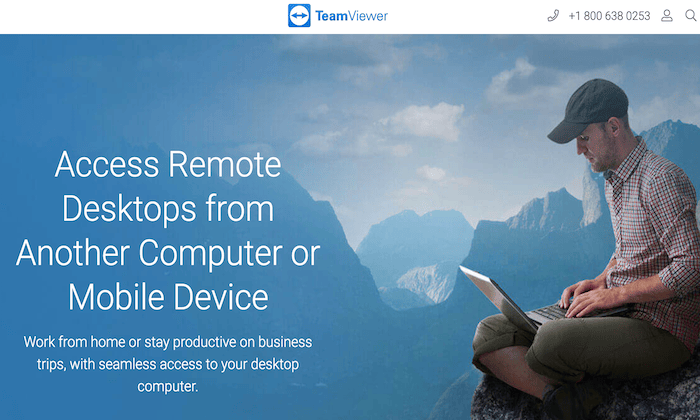
Years ago, PCs were the device of choice for business use. So when it came to supporting Macs and iOS devices, most software on the market wasn’t compatible. This was a problem for assisting clients and employees using Apple products.
But TeamViewer became a pioneer in the remote access space for Macs, iPads, and iPhones.
- Cross-platform access to iOS, macOS, Windows, Linux, and Android
- Enterprise-grade security and a VPN alternative
- Remote printing capabilities
- Easy to install and set up unattended access
- Admins can use it to access remote servers
- Mobile app available for iOS and Android devices
- In-session collaborations for co-workers and tech support
- Custom modules with company logos and branding
- Centralized management console and device reporting
Today, lots of other remote access tools support Apple devices. But not all of them do it as well as TeamViewer. Individuals can download it for free. Businesses can request a 14-day commercial trial before buying a license.
#3 – Remote Utilities Review — Best Remote Access for IT Teams
Remote Utilities is a bit unique compared to some of the other tools on our list. This software is built specifically for IT help desks.
The tool gives your team total control over your IT infrastructure.
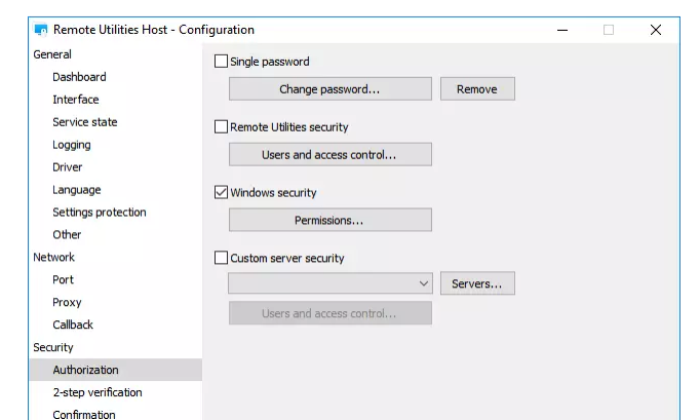
Here’s an overview of the software’s noteworthy highlights:
- Download on Windows, Mac, Linux, iOS, and Android
- File transfer mode
- Two-factor authentication (2FA)
- Unattended access to remote servers and workstations
- Remote access using LAN or VPN
- Deploy the program in an active directory network
- Proxy server support
- You can use a single PC on your LAN as a gateway to peers on the same network
- Easy to scale as large as you need it to be
- No mandatory, automatic, or unexpected upgrades
- Custom configurations, even for the most demanding IT requirements
Again, Remote Utilities isn’t designed for the average Joe or small business owners. This solution is for IT teams and users with more advanced needs. It’s a little bit more complex than some of the other tools on our list, but it gets the job done for technically inclined users.
Pricing starts at $99 with up to 20 endpoints per tech.
#4 – Zoho Assist Review — Best for Customer Support
Zoho Assist is a web-based remote support solution for businesses. It’s the best way to provide your customers with support through on-demand remote access.
The software also has the capability to manage unattended access sessions for in-house devices on PCs, laptops, servers, and mobile devices.
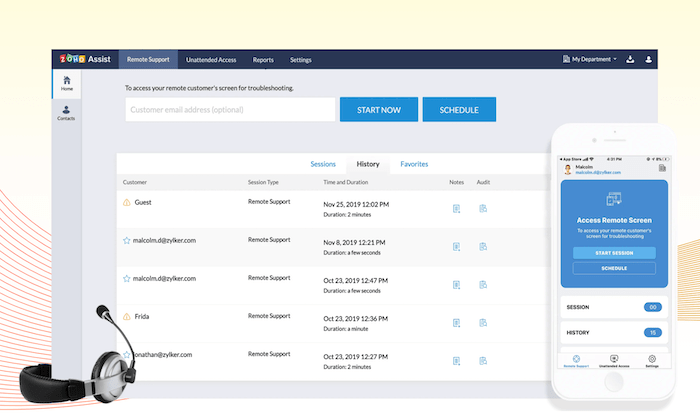
Zoho Assist is trusted by businesses across a wide range of industries. Whether your company is large or small, this software can accommodate your needs.
Let’s take a closer look at the features, benefits, and noteworthy highlights of Zoho Assist:
- On-demand remote support for troubleshooting with no prior installation
- Integrated voice and video chat for enhanced customer support
- Unattended remote access inside and outside your LAN
- Mass deployment options available (supports Windows and Mac)
- Secure file transfers with SSL 256-bit AES encryption
- Multiple monitor support and automatically detect active monitors
- Reboot and reconnect remote desktops from anywhere with a single click
The software is great for customer support, IT help desks, and outsourced MSP support.
Plans start at $8 per month for a single technician. The unattended access solution must be purchased separately from the remote support software. This also starts at $8 per month and includes 25 unattended computers. You can try Zoho Assist for free with a 15-day trial; no credit card required.
#5 – LogMeIn Pro Review — Best for Anytime File and Application Access
If you’re looking for a simple way to access files and apps on your computer from anywhere, LogMeIn Pro is the clear winner. The software is easy to use, secure, and extremely reliable.
It’s a popular choice for SMBs across all industries.

Let’s take a closer look at the software’s features to see why it comes so highly recommended:
- Simple step-by-step setup instructions for easy deployment
- Access your remote desktop as if you were in front of the screen
- Unlimited users and instant collaboration
- Free access to LastPass to store and manage all passwords
- Multiple monitor display view on a 1:1 local screen
- Remote printing functionality
- 1 TB of file storage to access and share from anywhere
- Quick access to frequently visited websites, cloud apps, and desktop apps
- Remote access on the go with the LogMeIn Pro mobile app
Plans for individual users start at $30 per month. This gives you access to two computers. To access up to ten computers, you’ll need a small business license, starting at $129 per month.
Summary
Which remote access software is the best? It depends on what you’ll be using it for.
Between Parallels Access, TeamViewer, Remote Utilities, Zoho Assist, and LogMeIn Pro, I know that one of these tools can accommodate your needs.
Just use the methodology I described earlier in the guide to help you choose the right option for your business. There’s something for everyone on my list.
The post Best Remote Access Software appeared first on Neil Patel.
from Blog – Neil Patel https://ift.tt/2HT5WKN
via IFTTT
No comments:
Post a Comment